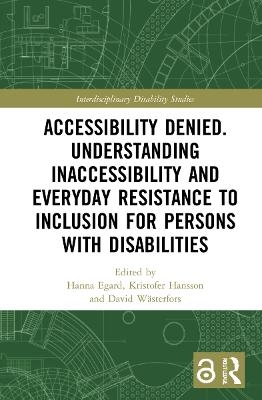
Accessibility Denied. Understanding Inaccessibility and Everyday Resistance to Inclusion for Persons with Disabilities
Routledge (Verlag)
978-0-367-63728-6 (ISBN)
With 12 chapters organised in three parts, the book takes a comprehensive approach to accessibility, covering transport and communication, knowledge and education, law and organisation. Topics within a wide cross-disciplinary field are covered, including disability studies, social work, sociology, ethnology, social anthropology, and history. The main example is Sweden, with its implementation of the United Nations Convention on the Rights of Persons with Disabilities within the context of the Nordic welfare state. By identifying and discussing persistent social and cultural conditions as well as recurring situations and interactions that nurture resistance to advancing accessibility, despite various strong laws promoting it, the book’s conclusions are widely transferable. It argues for the value of alternating between methods, theoretical perspectives, and datasets to explore how new arenas, resources and technologies cause new accessibility concerns — and possibilities — for persons living with impairments. We need to be able to follow actors closely to uncover how they feel, act, and argue, but also to connect to wider discursive and institutional patterns and systems.
This book will be of interest to scholars and students of disability studies, social work, sociology, ethnology, social anthropology, political science, and organisation studies.
Hanna Egard is Senior Lecturer in the Department of Social Work, Malmö University, Sweden. Kristofer Hansson is Senior Lecturer and Associate Professor in the Department of Social Work, Malmö University, Sweden. David Wästerfors is Professor of Sociology in the Department of Sociology, Lund University, Sweden.
Introduction: Into the fields of stubborn obstacles and lingering exclusion. Part 1 - City and transport. 1. Accessible enough? Legitimising half-measures of accessibility in Swedish urban environments. 2. The bus trip: Constraints, hierarchies and injustice. 3. Monitoring the standard – here, now and in person: Detecting accessibility faults as an engaged citizen. 4. Traveling insecurely: The association of security and accessibility in public transport. Part 2 - Knowledge and education. 5. Struggles for inclusion: The unrecognised toil of hearing-impaired students. 6. Gatekeepers and gatekeeping: On participation and marginalisation in everyday life. 7. Still waiting for the hand to be raised: On being crip killjoys at an ableist university. 8. Access to sexuality: Disabled people’s experiences of multiple barriers. 9. New barriers and new possibilities: Confronting language inaccessibility in and around a pandemic. Part 3 - Institution, law and history. 10. It is supposed to be a home: Barriers to everyday life decisions in group homes. 11. Making the law invisible: How bureaucratic resistance makes support inaccessible. 12. Using building requirements as a means to create inclusion: Accessibility and usability at a crossroads. Afterword.
| Erscheinungsdatum | 11.11.2021 |
|---|---|
| Reihe/Serie | Interdisciplinary Disability Studies |
| Zusatzinfo | 7 Halftones, black and white; 7 Illustrations, black and white |
| Verlagsort | London |
| Sprache | englisch |
| Maße | 156 x 234 mm |
| Gewicht | 453 g |
| Themenwelt | Sachbuch/Ratgeber ► Gesundheit / Leben / Psychologie ► Lebenshilfe / Lebensführung |
| Studium ► Querschnittsbereiche ► Prävention / Gesundheitsförderung | |
| Naturwissenschaften ► Geowissenschaften ► Geografie / Kartografie | |
| Sozialwissenschaften ► Soziologie | |
| ISBN-10 | 0-367-63728-6 / 0367637286 |
| ISBN-13 | 978-0-367-63728-6 / 9780367637286 |
| Zustand | Neuware |
| Informationen gemäß Produktsicherheitsverordnung (GPSR) | |
| Haben Sie eine Frage zum Produkt? |
aus dem Bereich


